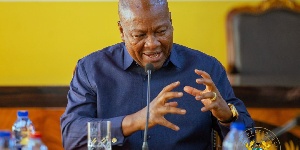
President Mahama Bans DSTV and Satellite TV at Jubilee House, Signals Nationwide Policy Shift
President John Dramani Mahama has officially banned DSTV and other satellite TV subscriptions at the Jubilee House, Ghana’s presidential palace.
The decision, which may soon extend to all government institutions, was confirmed by Minister of State for Government Communications, Felix Ofosu Kwakye, during an interview with JoyNews.
“There’s no office in this house allowed to subscribe to DSTV or any satellite television,” Kwakye stated firmly, emphasizing that while the move might seem minor, the financial implications are significant.
He clarified that only local television stations are now permitted at the presidency. According to him, this policy is part of President Mahama’s broader effort to cut unnecessary expenses and ensure prudent use of taxpayer money.
“This is a man deeply committed to making savings for the Ghanaian people,” Kwakye added.
Public Reaction: Applause and Calls for Expansion
The announcement has sparked widespread discussion, with many Ghanaians praising the decision as a step toward more responsible governance.
One commenter referenced the previous administration, alleging that nearly GHC 2 million was spent on DSTV subscriptions under former President Akufo-Addo’s tenure.
Another citizen hailed the move as bold and necessary, recommending that the ban be extended to hospitals, schools, and other government facilities where funds could be better allocated toward essential services.
“Redirecting this money can help improve our education and healthcare systems,” one netizen noted.
“If taxpayer money was funding these subscriptions, then this move is more than justified,” added another.
A New Era of Fiscal Discipline?
This decision appears to be part of a broader effort by President Mahama to demonstrate financial discipline and restore public confidence in how state resources are managed.
By eliminating such non-essential government expenditures, Mahama sends a clear message: public service is not a luxury, and leadership must reflect national priorities.
If extended nationwide, this ban could mark a turning point in public sector spending, pushing ministries and agencies to focus on what truly matters to Ghanaians.





